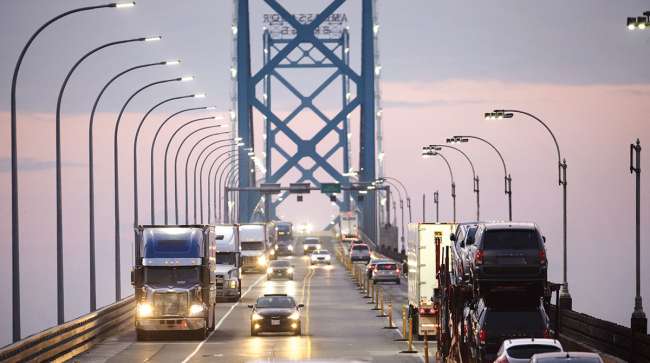Staff Reporter
Ontario, Michigan Partner to Explore Transportation Technologies

[Stay on top of transportation news: Get TTNews in your inbox.]
Government leaders in Ontario and Michigan have partnered to advance transportation and mobility technologies in a cross-border testing setting.
Officials from both governments — represented by Ontario’s Autonomous Vehicle Innovation Network, the Ministry of Transportation, the Michigan Department of Transportation and Michigan’s Office of Future Mobility and Electrification — signed a memorandum of understanding to explore the implementation of a cross-border testing environment to support the adoption of transportation technologies.
The goals of the partnership include identifying the potential economic, social and environmental benefits of increased collaboration between Ontario and Michigan with regard to automotive and transportation technologies. The effort will consider the needs of commercial and passenger vehicles.

Pawl
“This collaboration with Ontario is an acknowledgment of the importance of cross-border movement of goods and people as we work to build a stronger economy through safer, more equitable and environmentally conscious transportation here in Michigan,” said Trevor Pawl, chief mobility officer at Michigan’s Office of Future Mobility and Electrification. “Working together with our partners in Ontario, we can set the groundwork and testbed for cross-border transportation solutions that improve international crossing throughout the United States and Canada.”
Another goal is to identify challenges for people and goods pertaining to specific types of border crossing (such as land, air and water) and determine how transportation technologies could offer solutions. The partners will explore associated regulatory and policy considerations and develop a road map for implementation, including steps to establish cross-border pilots for certain technologies.
Michigan and Ontario share a few vital crossing points, including the Windsor-Detroit Gateway, the Blue Water Bridge linking Port Huron, Mich., and Sarnia, Ontario, and the International Bridge connecting the twin cities of Sault Ste. Marie, Mich., and Sault Ste. Marie, Ontario.
Crossing Count
Truck crossings so far in 2021:
Detroit — 698,475
Port Huron — 418,727
Sault St. Marie — 20,427
Source: Bureau of Transportation Statistics
Ontario and Michigan also share a closely integrated automotive supply chain, as parts cross the border multiple times before vehicles roll off assembly lines as finished products. According to the government partners, Ontario and Michigan are responsible for about 22% of North America’s automotive output. Additionally, many companies operate on both sides of the border, allowing them to share engineering expertise.
Both jurisdictions have placed an emphasis on pioneering connected and autonomous vehicle technologies. Ontario’s Autonomous Vehicle Innovation Network links the province’s automotive and technology sectors, post-secondary institutions and talent to support business and create jobs. Michigan is home to about 600 miles of roadway equipped for connected vehicle testing, and many of the state’s automotive suppliers conduct automated vehicle testing. In 2017, the two jurisdictions worked together on a cross-border automated vehicle test drive.

Fedeli
“This collaboration illustrates the combined strengths of Ontario and Michigan as innovation partners at the leading edge of electric, connected, autonomous and mobility technologies,” said Victor Fedeli, minister of economic development, job creation and trade for Ontario. “This forward-looking approach is essential to ensure our region remains at the forefront of a global industry that is fiercely competitive and continually subject to the forces of technology disruption.”
The first action set forth in the memorandum of understanding is a joint request for proposals, which currently is underway to study the economic potential of expanded border capacity and the benefits that can be achieved by using smart mobility solutions at international border crossings. Michigan DOT spokesman Michael Frezell described the RFP as a “broad-brush approach” to focus on commercial and passenger transportation. Proposal submissions are due Sept. 13.
Want more news? Listen to today's daily briefing below or go here for more info:




